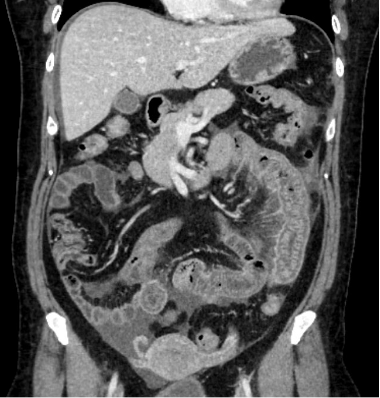Sunday Poster Session
Category: Small Intestine
P1968 - Hereditary Angioedema Presenting With Isolated Gastrointestinal Symptoms
Sunday, October 26, 2025
3:30 PM - 7:00 PM PDT
Location: Exhibit Hall

Ronan Allencherril, MD
Houston Methodist Hospital
Houston, TX
Presenting Author(s)
Ronan Allencherril, MD, Thomas R. McCarty, MD, MPH
Houston Methodist Hospital, Houston, TX
Introduction: Hereditary angioedema is a rare inherited condition presenting with recurrent episodes of swelling, most often involving the face or extremities. While subcutaneous attacks are the most common manifestation, hereditary angioedema may also affect the upper airway and the gastrointestinal tract. Here we present a case of a patient presenting with recurrent abdominal pain of unknown etiology, ultimately found to have hereditary angioedema.
Case Description/
Methods: A 43-year-old woman with a history of anxiety, depression, hypertension and hyperlipidemia presented to clinic for bloating, epigastric abdominal pain, and constipation. The episodic abdominal pain had prompted multiple visits to the emergency room (ER) over the last preceeding months. She reporting frequent acute onset generalized abdominal pain with vomiting and associated bloating with abdominal distention. Her symptoms had not responded significantly to trials of amitriptyline, hyoscyamine, simethicone, peppermint oil derivatives, or proton pump inhibitors (PPIs). Vitals and routine labs were overall unremarkable. Celiac serologies were normal. Esophagogastroduodenoscopy and colonoscopy were notable for reflux changes in the esophagus, antral predominant gastric intestinal metaplasia, and a normal appearing colon. Outpatient computed tomography (CT) of the abdomen and pelvis was also unremarkable. Within a few months after initial presentation she underwent repeat CT during acute onset of abdominal symptoms which showed a segmental small bowel wall thickening with severe edema and straining of the surrounding mucosa (Figure 1). The bowel wall was approximately 10 mm in thickness. Subsequent laboratory testing demonstrated severely decreased C1 esterase inhibitor levels, elevated urinary prostaglandins, normal serum and urinary histamine leels, as well as normal serum tryptase levels. Further questioning revealed the patient had started lisinopril a few months prior. Given the concern for hereditary angioedema, lisinopril was discontinued with complete resolution of symptoms.
Discussion: This is an interesting case of hereditary angioedema presenting with isolated gastrointestinal involvement. Hereditary angioedema typically manifests with subcutaneous swelling; however, edema of the bowel has been reported and can present with recurrent bouts of abdominal pain. In cases of hereditary angioedema, it is important recognize triggers, such as angiotensin converting enzyme inhibitors. Avoidance of triggers is essential to management.

Figure: Figure 1: Computed tomography (CT) with marked small bowel wall thickening.
Disclosures:
Ronan Allencherril indicated no relevant financial relationships.
Thomas McCarty: Covidien/Medtronic – Consultant. Endoquest Robotics – Consultant.
Ronan Allencherril, MD, Thomas R. McCarty, MD, MPH. P1968 - Hereditary Angioedema Presenting With Isolated Gastrointestinal Symptoms, ACG 2025 Annual Scientific Meeting Abstracts. Phoenix, AZ: American College of Gastroenterology.
Houston Methodist Hospital, Houston, TX
Introduction: Hereditary angioedema is a rare inherited condition presenting with recurrent episodes of swelling, most often involving the face or extremities. While subcutaneous attacks are the most common manifestation, hereditary angioedema may also affect the upper airway and the gastrointestinal tract. Here we present a case of a patient presenting with recurrent abdominal pain of unknown etiology, ultimately found to have hereditary angioedema.
Case Description/
Methods: A 43-year-old woman with a history of anxiety, depression, hypertension and hyperlipidemia presented to clinic for bloating, epigastric abdominal pain, and constipation. The episodic abdominal pain had prompted multiple visits to the emergency room (ER) over the last preceeding months. She reporting frequent acute onset generalized abdominal pain with vomiting and associated bloating with abdominal distention. Her symptoms had not responded significantly to trials of amitriptyline, hyoscyamine, simethicone, peppermint oil derivatives, or proton pump inhibitors (PPIs). Vitals and routine labs were overall unremarkable. Celiac serologies were normal. Esophagogastroduodenoscopy and colonoscopy were notable for reflux changes in the esophagus, antral predominant gastric intestinal metaplasia, and a normal appearing colon. Outpatient computed tomography (CT) of the abdomen and pelvis was also unremarkable. Within a few months after initial presentation she underwent repeat CT during acute onset of abdominal symptoms which showed a segmental small bowel wall thickening with severe edema and straining of the surrounding mucosa (Figure 1). The bowel wall was approximately 10 mm in thickness. Subsequent laboratory testing demonstrated severely decreased C1 esterase inhibitor levels, elevated urinary prostaglandins, normal serum and urinary histamine leels, as well as normal serum tryptase levels. Further questioning revealed the patient had started lisinopril a few months prior. Given the concern for hereditary angioedema, lisinopril was discontinued with complete resolution of symptoms.
Discussion: This is an interesting case of hereditary angioedema presenting with isolated gastrointestinal involvement. Hereditary angioedema typically manifests with subcutaneous swelling; however, edema of the bowel has been reported and can present with recurrent bouts of abdominal pain. In cases of hereditary angioedema, it is important recognize triggers, such as angiotensin converting enzyme inhibitors. Avoidance of triggers is essential to management.

Figure: Figure 1: Computed tomography (CT) with marked small bowel wall thickening.
Disclosures:
Ronan Allencherril indicated no relevant financial relationships.
Thomas McCarty: Covidien/Medtronic – Consultant. Endoquest Robotics – Consultant.
Ronan Allencherril, MD, Thomas R. McCarty, MD, MPH. P1968 - Hereditary Angioedema Presenting With Isolated Gastrointestinal Symptoms, ACG 2025 Annual Scientific Meeting Abstracts. Phoenix, AZ: American College of Gastroenterology.
